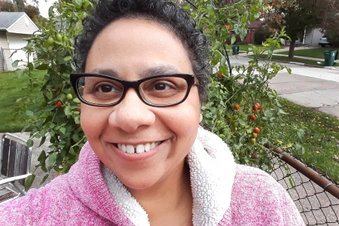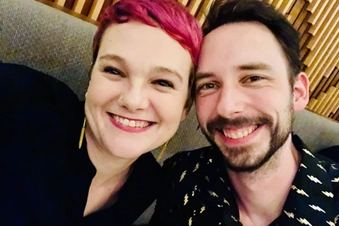Rising Above Ankylosing Spondylitis (AS)

Watch What You Eat
I was diagnosed with ankylosing spondylitis (AS) 8 years ago. But over the years, I’ve been able to regain mobility and feel safe in my body again. A low-starch diet helps keep my symptoms at bay. I used to follow a plant-based diet with lots of whole grains, starchy vegetables, and legumes. When I cut those out, both my stiffness and pain went down drastically. Eating this way hasn't always been easy, but it’s given me freedom from medication, including daily NSAIDs and TNF blockers.
-- Jolinda Johnson, a women’s health coach in Barcelona, Spain

Be the Squeaky Wheel
Don’t stay silent if you think your doctor isn't listening to you. Talk about your pain. And remember, you’re not complaining. You live this life every single day, so you’re the teacher here. Only you can help them understand what you're living with and how well your treatment is working. And speak up if your boss, spouse, kids, or anyone else in your life pushes you too hard or makes you do things that hurt. Accommodations can be made at work, and plans can change at home.
-- Jed Finley, a special education teacher with ankylosing spondylitis in St. Louis

Find Your Community, Fight for Your Care
I started Spoonie Chat (a Twitter hashtag and weekly forum for anyone living with ankylosing spondylitis), a chronic illness, or an invisible disability) as a welcoming space for women and people of color. Then my life just switched to online. And that was good. There's no one who’s going to understand you like a fellow AS-er. Another thing, if you think you have AS -- or another spondyloarthritis -- don't be afraid to ruthlessly focus on your approach to seeking the right treatment. Give your doctor a chance, but don’t accept apathy or disrespect. It can be hard to get a diagnosis and care for AS, especially if you're a Black woman. A lot of doctors just think we have lupus. The good news is activists and researchers are working to break down some of the barriers we face.
-- Dawn Gibson, a writer and disability advocate in Detroit

Tell Your Doctors What You’re Thinking
Express concerns about your symptoms. Explain why certain interventions or medications make you wary. Be honest about what you're taking. Tell them what you’re willing to do to improve your health, and what seems daunting or worrisome. Only by sharing your true goals can we get a true sense of what's important to you or frustrating you the most about your disease. With this knowledge and understanding, we can talk about your motivations for change and help you achieve the best possible outcome.
-- Anisha Dua, MD, MPH, a rheumatologist and associate professor at Northwestern Feinberg School of Medicine in Chicago

Know Your Worth
If you have a loved one with ankylosing spondylitis, remind them that they’re still a needed part of your family. AS can feel like a burden, and people who have it go through a lot. Sometimes they may struggle to see themselves as valuable and lovable. I try to look at my husband’s AS like another member of the family. One that, while not invited or welcome, does deserve to be acknowledged, treated with kindness, and understood inside and out. And caregivers, remember to find your own space to vent and rest. You feel the weight of AS, too. Just differently.
-- Auldyn Matthews, an AS advocate in Pittsburgh
Show Sources
IMAGES PROVIDED BY:
1) Jolinda Johnson
2) Jed Finley
3) Dawn Gibson
4) Dr. Anisha Dua
5) Auldyn Matthews
SOURCES:
Jolinda Johnson, Barcelona, Spain.
Jed Finley, St. Louis.
Dawn Gibson, Detroit.
Anisha Dua, MD, MPH, associate professor, Northwestern Feinberg School of Medicine, Chicago.
Auldyn Matthews, Pittsburgh.